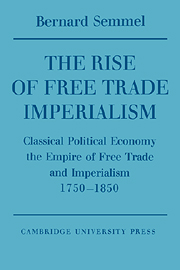 The Rise of Free Trade Imperialism
The Rise of Free Trade Imperialism Book contents
- Frontmatter
- Contents
- Preface
- 1 Introduction
- 2 Theory and politics of Free Trade Empire in the eighteenth century
- 3 The agrarian critique and the emergence of orthodoxy
- 4 The third school: Wakefield and the Radical economists
- 5 The Wakefield program for middle-class empire
- 6 Parliament, political economy, and the Workshop of the World
- 7 Cobdenism and the ‘dismal science’
- 8 Mercantilist revival
- 9 Classical political economy, the Empire of Free Trade, and imperialism
- Selected Bibliography
- Index
9 - Classical political economy, the Empire of Free Trade, and imperialism
Published online by Cambridge University Press: 23 October 2009
- Frontmatter
- Contents
- Preface
- 1 Introduction
- 2 Theory and politics of Free Trade Empire in the eighteenth century
- 3 The agrarian critique and the emergence of orthodoxy
- 4 The third school: Wakefield and the Radical economists
- 5 The Wakefield program for middle-class empire
- 6 Parliament, political economy, and the Workshop of the World
- 7 Cobdenism and the ‘dismal science’
- 8 Mercantilist revival
- 9 Classical political economy, the Empire of Free Trade, and imperialism
- Selected Bibliography
- Index
Summary
I stand in the position of being senior member of this club [the Political Economy Club], and the only survivor of its original members … By being a member of this Club I became the companion of Mr Ricardo, of the two Mills, of Colonel Torrens, of Mr Malthus, and of Mr Tooke … And here I may say with respect to the doctrines of Political Economy as it was taught in those days, I think that the principles which I then learned are perfectly unattackable. I hear a great many objections made to the received doctrines of Political Economy. We are told by a distinguished gentleman … that the doctrines of Political Economy will only suit the exact conditions of England at a certain time, but I am not of that opinion. It seems to me that the real doctrines of Political Economy as they were first taught by Adam Smith and as they were subsequently explained by the persons whose names I have ventured to quote, remain unimpeached; that they have never been successfully attacked; that they are in fact unattackable; that they are true now and will be true to all time.
G. W. Norman, Speech at Banquet Commemorating Centenary of The Wealth of Nations, 1876In 1948, J. B. Brebner wrote of laissez-faire as a ‘myth’, describing it as a battle-cry of the middle classes in their struggle with the landed aristocracy, and noting particularly that the philosophic Radicals—the Benthamites—were proponents not of laissez-faire, as they had been represented to be, but of a new bureaucratic collectivism.
- Type
- Chapter
- Information
- The Rise of Free Trade ImperialismClassical Political Economy the Empire of Free Trade and Imperialism 1750–1850, pp. 203 - 229Publisher: Cambridge University PressPrint publication year: 1970
